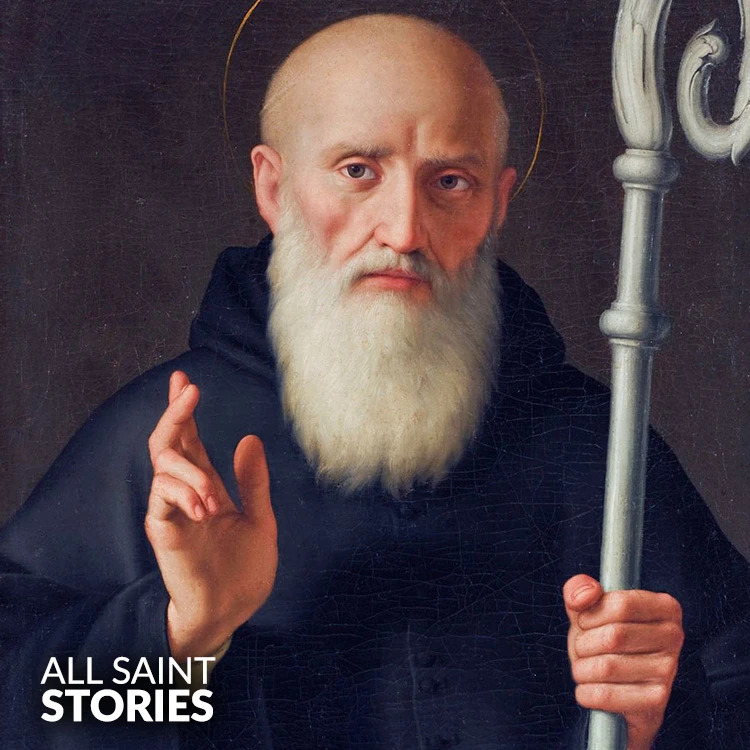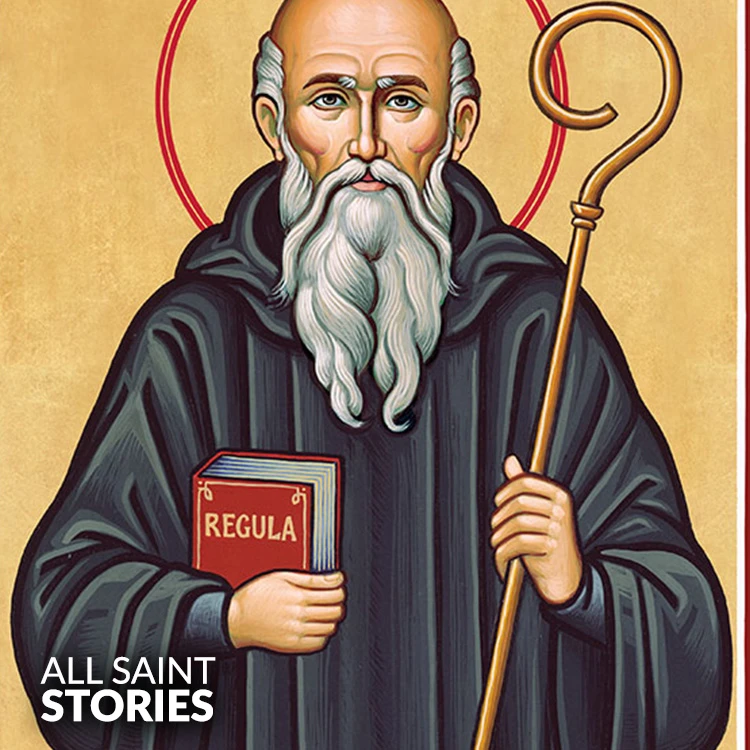Saint Benedict, holy father, you followed Christ faithfully and lived a life of prayer, work, and humility. Guide us in our daily struggles and help us to grow in faith and virtue. Protect us from harm and evil, and intercede for us that we may live according to God's will. Through your powerful intercession, grant us peace, strength, and courage in our journey of faith. Amen.
ST. BENEDICT OF NURSIA
ST. BENEDICT OF NURSIA

St. Benedict of Nursia was a 6th-century monk and the founder of Western monasticism. He wrote the Rule of St. Benedict, a spiritual and administrative guide that shaped monastic life for centuries. He is the patron saint of Europe and students.
St. Benedict of Nursia, born on March 2, 480, in the town of Nursia (now Norcia) in central Italy, is one of the most influential figures in Christian history. He is widely regarded as the father of Western monasticism. The twin brother of St. Scholastica, Benedict was raised in a noble Roman family and received a classical education in Rome. However, disillusioned by the moral decay of the city, he chose to leave behind the worldly life and pursue solitude and holiness.
He first lived as a hermit in a cave at Subiaco, where he practiced intense prayer and asceticism. Over time, his reputation for wisdom and holiness attracted disciples. Eventually, he organized them into monastic communities and laid the foundation for a new form of religious life.
Around 529, Benedict established the monastery of Monte Cassino, located between Rome and Naples. It became a model of monastic life and the center of religious scholarship. It was here that he wrote the Rule of St. Benedict, a document that would become the cornerstone of Western monasticism. The Rule emphasizes a balanced life of prayer, work, and study, and it promotes values such as humility, obedience, community living, and moderation.
Benedict’s approach to monastic life was deeply rooted in the Gospel and aimed to create an environment where individuals could grow in holiness while living in a stable and supportive community. The structure he created had an enduring impact on the development of Christian spirituality, education, and cultural preservation throughout the Middle Ages and beyond.
He died on March 21, 547, standing in prayer at the altar, and was buried next to his sister St. Scholastica. Though the Monte Cassino monastery was destroyed and rebuilt multiple times over the centuries (including during World War II), it remains a major pilgrimage site.
Pope Paul VI declared St. Benedict the Patron of Europe in 1964 in recognition of his profound role in shaping Christian civilization.
His feast is now celebrated on July 11 in the Roman Catholic Church (his original feast, March 21, is still observed in the Benedictine tradition).
Video Not Found
The information on this website is compiled from various trusted sources. While we aim for accuracy, some details may be incomplete or contain discrepancies.
If you notice any errors or have additional information about this saint, please use the form on the left to share your suggestions. Your input helps us improve and maintain reliable content for everyone.
All submissions are reviewed carefully, and your personal details will remain confidential. Thank you for contributing to the accuracy and value of this resource.
Credits & Acknowledgments
- Anudina Visudhar (Malayalam) – Life of Saints for Everyday
by Msgr. Thomas Moothedan, M.A., D.D. - Saint Companions for Each Day
by A. J. M. Mausolfe & J. K. Mausolfe - US Catholic (Faith in Real Life) – Informational articles
- Wikipedia – General reference content and images
- Anastpaul.com – Saint images and reflections
- Pravachaka Sabdam (Malayalam) – Saint-related content and insights
We sincerely thank these authors and platforms for their valuable contributions. If we have unintentionally missed any attribution, please notify us, and we will make the correction promptly.
If you have any suggestion about ST. BENEDICT OF NURSIA
Your suggestion will help improve the information about this saint. Your details will not be disclosed anywhere.
© 2026 Copyright @ www.allsaintstories.com





 English
English
 Italian
Italian
 French
French
 Spanish
Spanish
 Malayalam
Malayalam
 Russian
Russian
 Korean
Korean
 Sinhala
Sinhala
 Japanese
Japanese
 Arabic
Arabic
 Portuguese
Portuguese
 Bantu
Bantu
 Greek
Greek
 German
German
 Dutch
Dutch
 Filipino
Filipino